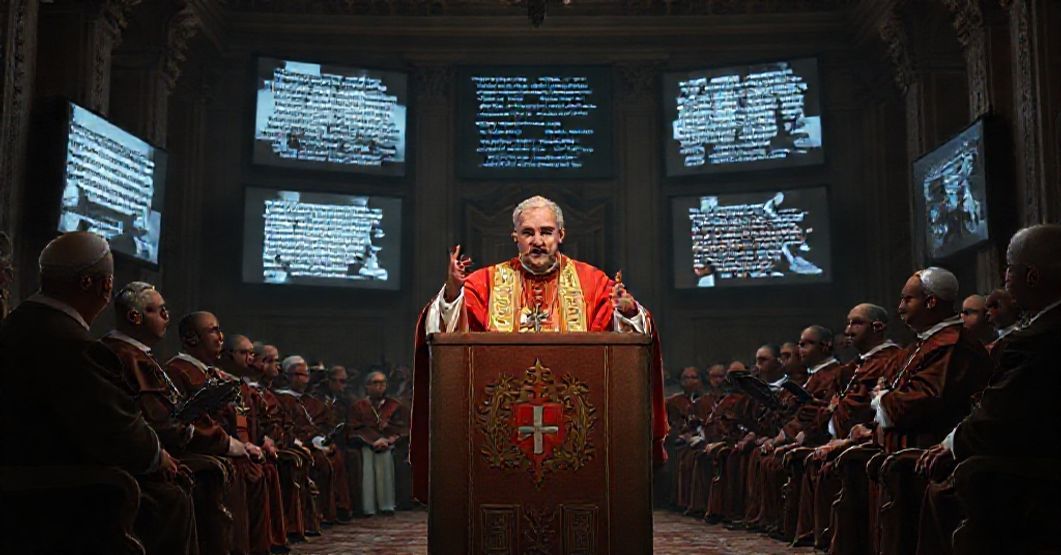Leo XIV’s Scripture Distortion Masks Conciliar Apostasy
The Catholic News Agency portal reports from Vatican City on November 17, 2025, that antipope Robert Prevost (“Leo XIV”) addressed the Catholic Biblical Federation steering committee. The usurper lamented Gospel distortion by “particular interests” in digital environments and cultures untouched by Scripture, while calling for “new forms of biblical outreach” to make God’s word “take root in people’s hearts.” The report emphasizes “easy access” to Scripture translations as essential for encountering God’s love, quoting Prevost’s claim that “the Church draws life not from herself but from the Gospel.” The article frames this as part of the conciliar sect’s ongoing efforts to adapt Scripture dissemination to modern technological and cultural contexts under the leadership of “Cardinal” Luis Tagle.
Scripture Without Magisterium: The Ultimate Protestant Temptation
The conciliar sect’s obsession with sola scriptura through “easy access” reveals its fundamental rupture with Catholic ecclesiology. Pius IX’s Syllabus of Errors condemned the notion that “Holy Scripture contains all things necessary for salvation” (Proposition 21). Yet Prevost’s insistence that “the Church draws life not from herself but from the Gospel” inverts the divine constitution of Christ’s Mystical Body. The Church precedes the New Testament canon historically and ontologically – as St. Augustine taught: “Ego vero Evangelio non crederem, nisi me catholicae Ecclesiae commoveret auctoritas” (Against the Epistle of Manichaeus, 5:6). By reducing the Church to a Scripture-distribution agency, Prevost adopts the Lutheran heresy condemned at Trent: “The written books and unwritten traditions… are to be received with equal affection of piety and reverence” (Session IV).
The fraudulent “pontiff” compounds this error by treating Scripture as raw material for cultural adaptation rather than the Church’s guarded treasure. When he speaks of “cultural spaces where the Gospel is unfamiliar or distorted by particular interests,” he omits the primary distortion: his own sect’s 60-year mutilation of Catholic doctrine through Vatican II’s Dei Verbum. This conciliar document’s assertion that “access to sacred Scripture ought to be widely available to the Christian faithful” (DV 22) deliberately severed biblical interpretation from the Magisterium – precisely the error St. Pius X condemned in Lamentabili Sane: “Ecclesiastical judgments… prove that the faith of the Church is contrary to history” (Proposition 3). Prevost’s call for “new forms of biblical outreach” continues this modernist project of replacing dogmatic certainty with endless hermeneutical experimentation.
Digital Gnosticism and the Eclipse of Sacramental Economy
Prevost’s concern about “new digital environments where the word of God is easily overshadowed” exposes the conciliar sect’s theological bankruptcy. The true crisis isn’t technological distraction but the deliberate destruction of the sacramental system through which Scripture receives its proper context. Pius XII warned in Mediator Dei that “the worship of the divine Majesty” through liturgy constitutes the primary encounter with God’s word (MD 16). Yet the Novus Ordo Missae – which Prevost’s sect promotes – gutted the sacrificial language connecting Scripture to Calvary’s re-presentation. When the antipope frets about Scripture being “overshadowed” online, he ignores how his sect’s invalid “eucharistic celebrations” have permanently overshadowed the Word made flesh in thousands of counterfeit “tabernacles.”
The emphasis on Bible translations as “indispensable” while saying nothing about the Index of Forbidden Books or proper exegetical controls proves this enterprise’s revolutionary character. St. Pius X’s Lamentabili condemned the notion that “non-Catholic exegetes have grasped the true sense of Holy Scripture better than Catholic exegetes” (Proposition 19), yet Prevost’s Catholic Biblical Federation collaborates with Protestant “experts” in producing ecumenical translations that dilute Marian, sacerdotal, and sacrificial terminology. This fulfills Pius IX’s condemnation of those who believe “Protestantism is nothing more than another form of the same true Christian religion” (Syllabus, Proposition 18).
The Silent Heresy: Naturalistic Evangelization
Nowhere does Prevost mention grace’s necessity for Scripture’s salvific reception – a silence screaming with Pelagian heresy. The Council of Trent dogmatized that “faith is the beginning of human salvation… a supernatural virtue by which we… believe to be true what has been divinely revealed” (Session VI, Chapter 8). By contrast, Prevost’s vision of “opening pathways to the Scriptures” so God’s word “may take root in people’s hearts” reduces conversion to a natural process of textual exposure. This mirrors the modernist error condemned in Lamentabili: “Revelation was merely man’s self-awareness of his relationship to God” (Proposition 20).
The ultimate fraud lies in Prevost posing as Scripture’s defender while presiding over the greatest scriptural distortion in Church history: the conciliar sect’s rejection of Christ’s Social Kingship. Pius XI’s Quas Primas established that “Christ reigns in the minds of men… in the wills of men… [and] of hearts” through the Church’s immutable doctrines (QP 16). Yet Prevost’s sect promotes religious liberty (contrary to Syllabus Proposition 77), interfaith worship (condemned in Mortalium Animos), and secularist dialogue – ensuring that whatever “Scripture” people encounter comes stripped of its demands for conversion and submission to the One True Church. When the antipope warns against “particular interests” distorting the Gospel, he unconsciously diagnoses his own sect’s captivity to Masonic-inspired globalism – the very “operation Fatima” described in the provided files, where “religious relativism” becomes the ultimate goal of manipulated “revelations.”
Source:
Pope Leo XIV laments distortion of the Gospel for ‘particular interests’ (catholicnewsagency.com)
Date: 17.11.2025
